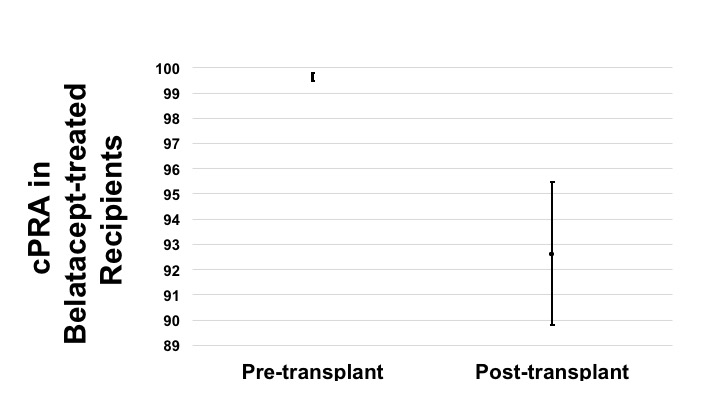Reduction of Pre-Existing Alloantibodies in Highly Sensitized Belatacept-Treated Kidney Recipients
1Emory University School of Medicine, Atlanta, GA, 2University of Cincinnati, Cincinnati, OH, 3University of Pennsylvania, Philadelphia, PA
Meeting: 2019 American Transplant Congress
Abstract number: B176
Keywords: Co-stimulation, HLA antibodies, Immunosuppression
Session Information
Session Name: Poster Session B: Kidney Immunosuppression: Desensitization
Session Type: Poster Session
Date: Sunday, June 2, 2019
Session Time: 6:00pm-7:00pm
 Presentation Time: 6:00pm-7:00pm
Presentation Time: 6:00pm-7:00pm
Location: Hall C & D
*Purpose: Recent evidence suggests that belatacept reduces the durability of pre-existing antibodies to class I and class II human leukocyte antigens (HLA). Belatacept has a well-described effect of minimizing HLA antibody formation in non-sensitized recipients. However, only preliminary data have shown belatacept also has an impact on highly-sensitized kidney transplant recipients. A more complete data set of highly sensitized belatacept-treated recipients is presented here.
*Methods: In this case series of 163 kidney transplant candidates with a calculated panel reactive antibody (cPRA) activity of ≥98-100%, 72 were transplanted between 12/4/2014 and 4/15/2017; 60 of these transplanted patients remained on belatacept consecutively for at least six months.
*Results: A loss in the breadth and strength of HLA antibody reactivities as assessed by FlowPRA was observed in belatacept-treated patients compared to a control group of highly sensitized recipients who did not receive belatacept (n= 9). The HLA antibody reduction was evident in 48% (29/60) for class I and 40% (24/60) for class II. Importantly, in the 60 belatacept-treated recipients a statistically significant reduction (Figure, p= 0.000003) in their post-transplant cPRA was also identified (any antigens to which their corresponding antibodies fell below MFI levels of 2000 were no longer considered unacceptable).
*Conclusions: Although the impact of other immunosuppressive agents and other post-transplant factors cannot be ruled in or out in this study, it is tempting to speculate that belatacept could serve as a novel agent for desensitization. These findings indicate belatacept may reduce HLA antibodies in highly sensitized recipients and could be a treatment alternative to improve pre-transplant compatibility with organ donors. Future study will investigate the role of prospective belatacept monotherapy in highly sensitized waitlist candidates.
To cite this abstract in AMA style:
Parsons RF, Bumb S, Decker H, Zahid A, Sullivan C, Pearson T, Larsen C, Levine M, Kamoun M, Bray RA, Gebel HM. Reduction of Pre-Existing Alloantibodies in Highly Sensitized Belatacept-Treated Kidney Recipients [abstract]. Am J Transplant. 2019; 19 (suppl 3). https://atcmeetingabstracts.com/abstract/reduction-of-pre-existing-alloantibodies-in-highly-sensitized-belatacept-treated-kidney-recipients/. Accessed March 3, 2026.« Back to 2019 American Transplant Congress

